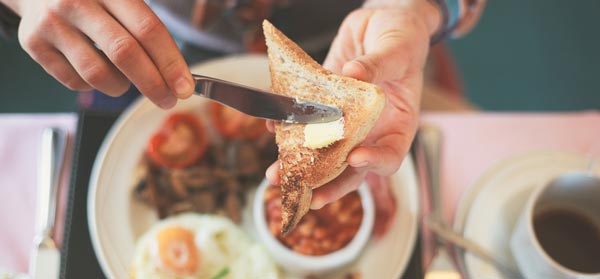Does eating breakfast make you healthier? Does eating at night mean you’ll put on weight? These are questions we’ve heard before but new research suggests that what we think we know about the best and worst times to eat may be wrong. Today we bust some food myths and find out why it doesn’t matter when you eat.
Myth #1: Breakfast is the most important meal
The benefits of eating breakfast are many and difficult to disagree with. Importantly, a nutritious morning meal can give your body and brain fuel to begin your day. The notion that breakfast kick-starts your metabolism has fallen from favour. The myths begin when we talk about non-breakfast eaters as being more likely to gain weight due to a slow metabolism and making unhealthy food choices later in the day due to low blood-sugar levels. For years, the message was that breakfast was the most important meal of the day. Now, studies like this one from The American Journal of Clinical Nutrition say that most research that linked breakfast and weight gain are biased, with many funded by cereal companies. The truth is, if you’ve managed to get by all this time without eating breakfast, there’s no real need to begin. What matters is that your first meal of the day is healthy, including carbs, healthy fats and a little protein. If you’re tired of cereal, why not check out these tasty breakfast ideas?
Myth #2: Eating at night causes weight gain
It wouldn’t be unfair to attribute this very pervasive eating myth to Oprah Winfrey, who once famously said that she doesn’t eat after 7.30pm to avoid weight gain. The reality is there’s no magical time on the clock that suddenly makes the food passing into your mouth more likely turn into fat on your hips. Weight gain happens when you consume more energy than your body burns. In other words, if you eat more food than you need that day, your body will store the excess energy as fat. How many kilojoules (a measure of energy) you require each day depends on a range of factors, including your age, weight, height, gender and lifestyle. There are many resources online that can help you work out how many calories you should consume. Unless you have digestive issues, when you eat should not affect your weight as long as you don’t overeat and you maintain an active lifestyle.
Myth #3: Snacking helps avoid weight gain
We’re often told that it’s important to eat three square meals per day with snacks in between. In a world where everyone’s body processes food in the same way, perhaps that would be true. In fact, we all have different nutritional needs. Snacking has been said to keep the metabolism working and prevent the body from storing energy too quickly. However, according to this study in The British Journal of Nutrition, your body will break down energy just the same, whether you’ve eaten in three spaced-out portions or smaller, more frequent snacks. As for what time you eat, it’s simply about energy in versus energy out. That said, some people do function better eating smaller meals punctuated by snacks during the day. Snacks can have the benefit of helping a person avoid binge-eating and preventing blood-sugar levels from crashing (leading to unhealthy food choices). The best method is to pay attention to your own body’s needs, which can change week-to-week and month-to-month. Eat when you’re hungry, stop when you’re full, and drink enough water.
Do you have any other food myths you’d like busted? Let us know in the comments below.
Related articles:
Five worst breakfast foods
Eating habits you must break
How to drink more water

